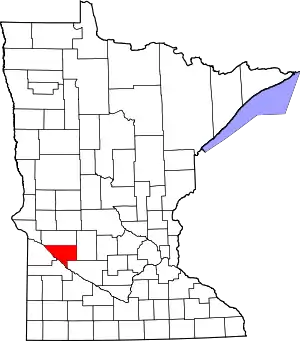Montevideo | |
|---|---|
 Artigas Plaza in Montevideo | |
 Location of Montevideo within Chippewa County, Minnesota | |
| Coordinates: 44°57′02″N 95°42′55″W / 44.95056°N 95.71528°W | |
| Country | United States |
| State | Minnesota |
| County | Chippewa |
| Platted | May 25, 1870 |
| Incorporated (village) | March 4, 1879 |
| Incorporated (city) | June 30, 1908 |
| Government | |
| • Type | Council – Manager |
| • Mayor | Erich Winter |
| Area | |
| • Total | 4.80 sq mi (12.44 km2) |
| • Land | 4.71 sq mi (12.20 km2) |
| • Water | 0.09 sq mi (0.23 km2) |
| Elevation | 1,017 ft (310 m) |
| Population | |
| • Total | 5,398 |
| • Estimate (2022)[4] | 5,300 |
| • Density | 1,145.59/sq mi (442.31/km2) |
| Time zone | UTC-6 (Central) |
| • Summer (DST) | UTC-5 (CDT) |
| ZIP code | 56265 |
| Area code | 320 |
| FIPS code | 27-43720[5] |
| GNIS feature ID | 2395377[2] |
| Website | montevideomn.org |
Montevideo (/ˌmɒntəˈvɪdioʊ/ MON-tə-VIH-dee-oh)[6] is a city in Chippewa County, Minnesota, United States. The population was 5,398 at the 2020 census.[3] It is the county seat of Chippewa County.
The area around Montevideo was populated by Native Americans and fur traders during the first half of the 19th Century. After the Dakota War of 1862, the US government opened the area to homesteaders. Railroads were built, and settlers followed, including Civil War veterans, Norwegians, Germans, Swedes, Dutch, and Irish. Montevideo was incorporated in 1879.[7]
Geography
Montevideo is in a double river valley where the Minnesota and Chippewa rivers converge, about 140 miles (230 km) west of Minneapolis, at the junction of U.S. Highways 59 and 212 with Minnesota State Highways 7 and 29.
The surrounding topography is dominated by farmland and prairies, as well as river valleys with many scenic overlooks and small bluffs.
According to the United States Census Bureau, the city has an area of 4.85 square miles (12.56 km2), of which 4.76 square miles (12.33 km2) is land and 0.09 square miles (0.23 km2) is water.[8]
Climate
Montevideo, like the rest of Minnesota, has a four-season humid continental climate with great differences between summer and winter.[9] The average July high is 82 °F (28 °C) with the average January high being 22 °F (−6 °C).[10] The station recorded data from 1891 to 2019.
| Climate data for Montevideo, Minnesota (1991–2020 normals, extremes since 1891) | |||||||||||||
|---|---|---|---|---|---|---|---|---|---|---|---|---|---|
| Month | Jan | Feb | Mar | Apr | May | Jun | Jul | Aug | Sep | Oct | Nov | Dec | Year |
| Record high °F (°C) | 69 (21) |
64 (18) |
88 (31) |
100 (38) |
105 (41) |
107 (42) |
110 (43) |
106 (41) |
105 (41) |
94 (34) |
82 (28) |
72 (22) |
110 (43) |
| Mean maximum °F (°C) | 44 (7) |
47 (8) |
64 (18) |
81 (27) |
90 (32) |
93 (34) |
93 (34) |
91 (33) |
89 (32) |
84 (29) |
64 (18) |
47 (8) |
96 (36) |
| Mean daily maximum °F (°C) | 21.9 (−5.6) |
26.8 (−2.9) |
39.3 (4.1) |
55.3 (12.9) |
68.8 (20.4) |
78.5 (25.8) |
82.2 (27.9) |
80.1 (26.7) |
73.5 (23.1) |
59.0 (15.0) |
41.8 (5.4) |
27.6 (−2.4) |
54.6 (12.6) |
| Daily mean °F (°C) | 11.9 (−11.2) |
16.1 (−8.8) |
28.8 (−1.8) |
43.5 (6.4) |
57.1 (13.9) |
67.3 (19.6) |
71.0 (21.7) |
68.6 (20.3) |
60.8 (16.0) |
46.9 (8.3) |
31.4 (−0.3) |
18.3 (−7.6) |
43.5 (6.4) |
| Mean daily minimum °F (°C) | 2.0 (−16.7) |
5.4 (−14.8) |
18.4 (−7.6) |
31.7 (−0.2) |
45.4 (7.4) |
56.1 (13.4) |
59.8 (15.4) |
57.1 (13.9) |
48.1 (8.9) |
34.7 (1.5) |
21.1 (−6.1) |
9.1 (−12.7) |
32.4 (0.2) |
| Mean minimum °F (°C) | −20 (−29) |
−15 (−26) |
−5 (−21) |
18 (−8) |
31 (−1) |
44 (7) |
49 (9) |
46 (8) |
33 (1) |
20 (−7) |
3 (−16) |
−13 (−25) |
−23 (−31) |
| Record low °F (°C) | −38 (−39) |
−39 (−39) |
−25 (−32) |
2 (−17) |
16 (−9) |
31 (−1) |
31 (−1) |
34 (1) |
14 (−10) |
4 (−16) |
−23 (−31) |
−33 (−36) |
−39 (−39) |
| Average precipitation inches (mm) | 0.67 (17) |
0.76 (19) |
1.90 (48) |
2.48 (63) |
3.66 (93) |
4.35 (110) |
3.82 (97) |
3.96 (101) |
3.01 (76) |
2.46 (62) |
1.56 (40) |
0.82 (21) |
29.45 (748) |
| Average snowfall inches (cm) | 8.0 (20) |
9.9 (25) |
7.9 (20) |
4.6 (12) |
0.1 (0.25) |
0.0 (0.0) |
0.0 (0.0) |
0.0 (0.0) |
0.0 (0.0) |
0.4 (1.0) |
4.3 (11) |
10.3 (26) |
45.5 (116) |
| Average extreme snow depth inches (cm) | 7 (18) |
7 (18) |
5 (13) |
2 (5.1) |
0 (0) |
0 (0) |
0 (0) |
0 (0) |
0 (0) |
0 (0) |
3 (7.6) |
7 (18) |
12 (30) |
| Source: NOAA [11] | |||||||||||||
Demographics
| Census | Pop. | Note | %± |
|---|---|---|---|
| 1880 | 862 | — | |
| 1890 | 1,437 | 66.7% | |
| 1900 | 2,146 | 49.3% | |
| 1910 | 3,056 | 42.4% | |
| 1920 | 4,419 | 44.6% | |
| 1930 | 4,319 | −2.3% | |
| 1940 | 5,220 | 20.9% | |
| 1950 | 5,459 | 4.6% | |
| 1960 | 5,693 | 4.3% | |
| 1970 | 5,661 | −0.6% | |
| 1980 | 5,845 | 3.3% | |
| 1990 | 5,499 | −5.9% | |
| 2000 | 5,346 | −2.8% | |
| 2010 | 5,383 | 0.7% | |
| 2020 | 5,398 | 0.3% | |
| 2022 (est.) | 5,300 | [4] | −1.8% |
| U.S. Decennial Census[12] 2020 Census[3] | |||
2010 census
As of the census of 2010, there were 5,383 people, 2,326 households, and 1,404 families living in the city. The population density was 1,130.9 inhabitants per square mile (436.6/km2). There were 2,510 housing units at an average density of 527.3 per square mile (203.6/km2). The racial makeup of the city was 92.0% White, 0.6% African American, 0.7% Native American, 0.5% Asian, 4.6% from other races, and 1.5% from two or more races. Hispanic or Latino of any race were 8.4% of the population.
There were 2,326 households, of which 28.0% had children under the age of 18 living with them, 44.5% were married couples living together, 11.1% had a female householder with no husband present, 4.8% had a male householder with no wife present, and 39.6% were non-families. 35.1% of all households were made up of individuals, and 18.2% had someone living alone who was 65 years of age or older. The average household size was 2.25 and the average family size was 2.86.
The median age in the city was 41 years. 23.4% of residents were under the age of 18; 8% were between the ages of 18 and 24; 23.1% were from 25 to 44; 25% were from 45 to 64; and 20.3% were 65 years of age or older. The gender makeup of the city was 47.0% male and 53.0% female.
2000 census
As of the census of 2000, there were 5,346 people, 2,353 households, and 1,444 families living in the city. The population density was 1,190.5 inhabitants per square mile (459.7/km2). There were 2,551 housing units at an average density of 568.1 per square mile (219.3/km2). The racial makeup of the city was 97.10% White, 0.11% African American, 0.41% Native American, 0.34% Asian, 0.06% Pacific Islander, 0.80% from other races, and 1.18% from two or more races. Hispanic or Latino of any race were 2.00% of the population.
There were 2,353 households, out of which 28.6% had children under the age of 18 living with them, 48.6% were married couples living together, 9.2% had a female householder with no husband present, and 38.6% were non-families. 34.8% of all households were made up of individuals, and 18.3% had someone living alone who was 65 years of age or older. The average household size was 2.24 and the average family size was 2.89.
In the city, the population was spread out, with 24.5% under the age of 18, 8.0% from 18 to 24, 24.3% from 25 to 44, 22.6% from 45 to 64, and 20.6% who were 65 years of age or older. The median age was 40 years. For every 100 females, there were 89.2 males. For every 100 females age 18 and over, there were 86.3 males.
The median income for a household in the city was $32,447, and the median income for a family was $44,706. Males had a median income of $30,838 versus $19,013 for females. The per capita income for the city was $18,025. About 4.7% of families and 10.1% of the population were below the poverty line, including 12.2% of those under age 18 and 8.9% of those age 65 or over.
.png.webp)
Sister City relationship
The relationship with Montevideo, Uruguay, began in 1905 when the mayor of each city sent a national flag to the other.[13]
Local media
KDMA, KKRC, and KMGM are local radio stations owned by Iowa City Broadcasting Company, Inc. KRAM-LP is owned by Thunderhawk Broadcasting, Inc.
Notable people
- Wayne Brabender (1945–), professional basketball player for Real Madrid and the Spanish National Basketball team
- Alfred M. Falkenhagen, Minnesota state legislator and farmer
- Paul Gruchow (1947–2004), professor at St. Olaf and Concordia colleges
- Vernon K. Jensen (1912–1982), veterinarian and Minnesota state senator
- David Minge (1942–), U.S. representative and Minnesota Court of Appeals judge
- Molly Schuyler, competitive eater
References
- ↑ "2020 U.S. Gazetteer Files". United States Census Bureau. Retrieved July 24, 2022.
- 1 2 U.S. Geological Survey Geographic Names Information System: Montevideo, Minnesota
- 1 2 3 "Explore Census Data". United States Census Bureau. Retrieved June 25, 2023.
- 1 2 "City and Town Population Totals: 2020-2022". United States Census Bureau. June 25, 2023. Retrieved June 25, 2023.
- ↑ "American FactFinder". United States Census Bureau. Archived from the original on February 12, 2020. Retrieved January 31, 2008.
- ↑ "Minnesota Pronunciation Guide". Associated Press. Archived from the original on July 22, 2011. Retrieved July 4, 2011.
- ↑ "Montevideo Minnesota Community Guide". Retrieved October 1, 2022.
- ↑ "US Gazetteer files 2010". United States Census Bureau. Archived from the original on July 2, 2012. Retrieved November 13, 2012.
- ↑ "Montevideo, Minnesota Koppen Climate Classification (Weatherbase)".
- ↑ "Montevideo, Minnesota Travel Weather Averages (Weatherbase)".
- ↑ "NOAA Forecast Office for Minneapolis, MN - Montevideo station". Retrieved July 25, 2022.
- ↑ United States Census Bureau. "Census of Population and Housing". Retrieved July 23, 2014.
- ↑ Hopfensperger, Jean. "Two Montevideos share more than just a name". Star Tribune. Retrieved February 2, 2021.
